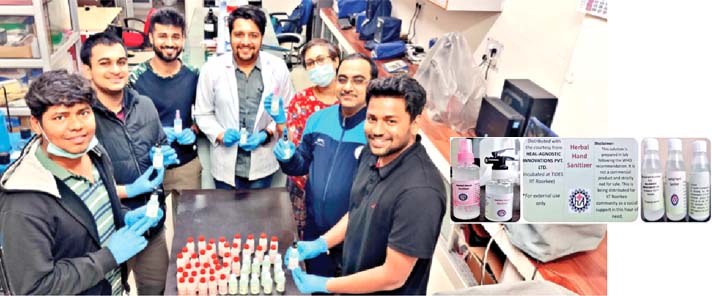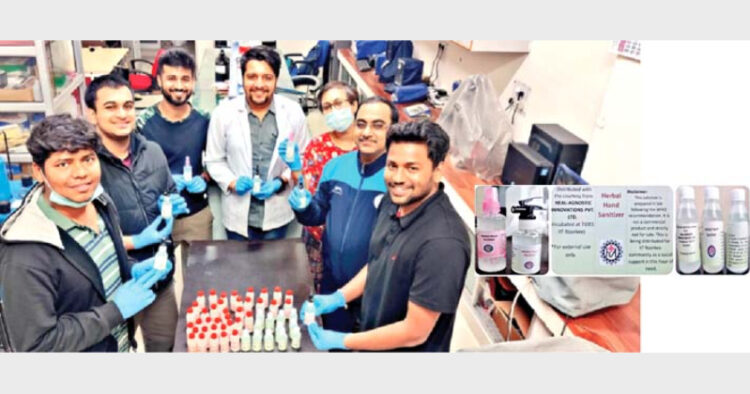Not just the State machinery led by the sensitive Government but private agencies, social organisations and individuals, are taking the coronavirus challenge head on with a collaborative and innovative approach

The Team of IIT Roorkee researchers who have developed herbal sanitiser for the campus (Inset).
ARE BHARATIYAS LEADING THE WORLD IN FIGHT AGAINST COVID-19?’ could have easily been turned into the affirmative sentence instead of a question. However, a simple opening sentence saying Bharatiyas are leading the world in tiding over the coronavirus crisis may raise eyebrows of some critics. And hence, the best way is to cite some of the innovations that are compelling the world at large to hail Bharatiyas. Despite the attempt to misrepresent the hydroxychloroquine episode as the arms twisting by the US, the fact remains that Bharat had taken the decision much earlier and and lifted restrictions to allow limited supply of the drug to countries in need. Within a few hours, not just the US President but other nations also publicly praised the PM of Bharat. The latter also received praise from other nations. What’s behind this? The world is so dependent on Bharatiya supplies that it cannot, more so at a time when even the most developed countries have plunged into an unanticipated crisis, fight it without Bharat. But this is not just about the PM or the Government. The opening sentence says ‘Bharatiyas’ and we ned look beyond the stories that make the front page news.
It is not one institute or government bodies that is leading the battle; instead a range of players, both from the private as well as the public sector, have earned accolades from international media for innovations. Drones, robots, isolation wards in trains, and so on, the list is indeed exhaustive. Why not begin with something truly unheard of? We know that social distancing is the key to contain the spread of coronavirus. Collecting and testing samples, however, cannot be envisaged without establishing physical contact with the suspected person. Come Marut, a startup based in Hyderabad, and the entire picture has changed. The company has demonstrated how drones can be used to not only deliver medicines but also collect samples. Some IIT alumni have also innovated a way to conduct thermal screening using drones.
Hand sanitisers were in short supply and when the surge in demand fueled exorbitant hike in prices. Besides the timely interevention by the Government, students from IIT Roorkee produced herbal hand sanitiser, which they gave away for free across the campus.
When we combine the big-ticket inventions from DRDO and other agencies with these trivial looking innovations it reflects the length an ordinary Bharatiyas can go during extraordinary situations. DRDO is in fact at the forefront in terms of innovation during the pandemic. The Vehicle Research Development Establishment, part of DRDO, has come up with full-body disinfection chamber. Dubbed as Personnel Sanitisation Enclosure (PSE), these are small chambers equipped with soap and sanitiser dispensers that help disinfect the person who may have come into contact with the infamous virus. A mist of hypo sodium chloride is released and the person just needs to keep eyes closed during the process. The invention can be placed at hospitals and other critical places, and once the lockdown is lifted it can be used at the gates of places with high footfalls. DRDO has asserted that at least 650 people can pass through the chamber in a single refill.
Two other laboratories of DRDO, Research Centre Imarat (RCI) and TBRL Chandigarh, came up with face protection masks that can be used by health professionals. It is notable that the thermoplastic used as a raw material for these shields comes from renewable sources and is biodegradable. To mass produce the shields, 3D printing technology is being used and thousands of these full-face covering masks are being churned out daily from the TBRL facility. DRDO has also designed bio-suits that come with seam sealing glue for preventing health workers from coming in contact with the deadly virus. The best part is that 7,000 bio suits are being currently produced on a daily basis.
Another unique and timely invention has come from Jawaharlal Nehru Centre for Advanced Scientific Research. The institution has developed anti-microbial coating, which can be the perfect answer to containing the spread of coronavirus by killing the virus through coating on surfaces. Not only can the coating kill SARS-COV-19, the virus behind COVID-19 pandemic, it can also keep at bay pathogenic bacteria and fungi. The best use of this is on personal protective equipment and apparels and other tools used by health professionals.
One of the most inspiring innovation stories is that of R&D head of Mylab Discovery, Minal Bhosale. A virologist has developed the first made in Bharat testing kit that has enabled the country heed the ‘test, test, test’ call of WHO. While the imported testing kits would take at least 6-7 hours to dignose the sample, Mylab kits reduced this to just two and a half hours. Ms. Bhosle, submitted her product for approval from National Institute of Virology (NIV) only a day ahead of delivering her child. Hers and that of other Bharatiya companies which have been given a nod by NIV to release their kits in the market to scale up testing.
CSIR-Institute of Genomics and Integrative Biology (IGIB) on its part has produced paper strip testing technology that can diagnose viral RNA of coronavirus in less than one hour. Robotics is being used to attend to quarantined persons minimising the threat of physical contact, produced by a Tamil Nadu-based company. Authorities in different parts are monitoring hotspots using drone technology and sanitising the areas.
The Government is certainly playing the role of the facilitator. Department of Science and Technology has committed INR 56 crore to support 50 innovations that can assist the government in containing the coronavirus threat. With a view to fast-tracking commercialisation of new products and processes, Centre for Augmenting WAR with COVID-19 Health Crisis (CAWACH) has been set up. The government was also quick in allowing Bharatiya scientific community to collect nasal and throat samples of infected persons so that research and development on various fronts including testing kits, vaccine and medication can be accelerated. The entire machinery, including government, social-religious organisations, private agencies and individuals, is taking the coronavirus challenge head on. As commoners, we can also do our bit by adhering to government directives during lockdown. The title of the article, keeping in view the above-cited facts, is thus in the affirmative.
(The writer is a Chartered Accountant, author and blogger. He has served as an Independent Director on the Boards of many public sector banks in Bharat)














Comments